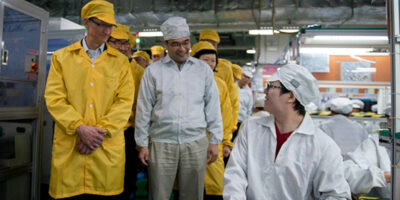
(Photo by AFP) / China OUT
Supply chain issues are about to disrupt Christmas again
While many thought supply chain issues would be an issue of the past as the world returns to normality, the reality is that we may be heading toward more disruptive times. The war in Ukraine has already caused several problems in the supply chain, while China’s ongoing crackdown on COVID-19 continues to effect businesses globally.
The latest round of lockdowns in China may just have reached a boiling point. Reports of workers protesting working conditions in manufacturing plants followed by protests by students against extended lockdowns have been making headlines around the world.
For many businesses, China represents an important part of the supply chain, with most products having some influence from China’s manufacturing industry. From smartphones, laptops, batteries and electrical components, the world’s manufacturer is now struggling to meet the increasing global demand.
Some industries have already moved their manufacturing plants to Vietnam and India. For example, Apple, which has been manufacturing its devices in China for years, has now moved manufacturing of some devices to India.
According to a report by Bloomberg, Apple’s key manufacturing hub of Zhengzhou in China which is operated by Foxconn Technology Group is likely to result in a production shortfall of close to six million iPhone Pro units this year. Supply chain issues in China have also seen Apple shares drop by up to 17% so far this year. Extended lockdowns in China are expected to set production back further.
Bloomberg also reported that the Foxconn facility produces the iPhone 14 Pro and Pro Max devices, which are Apple’s most in-demand devices this year. Apple has lowered its overall production target to about 87 million units from an earlier projection of 90 million units.

People gather on a street in Shanghai on November 27, 2022, where protests against China’s zero-Covid policy took place the night before following a deadly fire in Urumqi, the capital of the Xinjiang region. (Photo by Hector RETAMAL / AFP)
Interestingly, while the problems in China are expected to have a major impact on the global supply chain, the semiconductor industry has had the foresight to increase its investments in plants outside of China to ensure their production is not disrupted. US restrictions on certain Chinese brands have already seen key semiconductor players investing in production plants in the US itself with some moving to Europe and India.
Meanwhile, in Southeast Asia, businesses are already expecting a boost in sales for the Christmas holiday season. The retail industry, both online and physical, has seen tremendous growth in the past few months as the region moves out from the pandemic. Online shopping festivals in recent months also continue to produce record-breaking figures.
Yet, there is still a concern among businesses if they can provide their customers with their desired products this holiday season. With electronic and mobile devices expected to see increased demand for Christmas, disruption to the supply chain would affect them.
The Straits Times reported several businesses in Singapore have already increased their stocks by up to 30% in anticipation of increased customer demands and also to avoid any supply chain issues. This does not only include electrical devices but holiday products as well, such as Christmas trees and imported food ingredients.
With the situation in China seemingly not looking to improve anytime soon, businesses that rely on the nation and have not taken the necessary steps to deal with the disruption may just find themselves experiencing a colder winter season.
READ MORE
- Safer Automation: How Sophic and Firmus Succeeded in Malaysia with MDEC’s Support
- Privilege granted, not gained: Intelligent authorization for enhanced infrastructure productivity
- Low-Code produces the Proof-of-Possibilities
- New Wearables Enable Staff to Work Faster and Safer
- Experts weigh in on Oracle’s departure from adland


